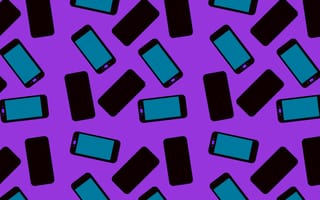
The odds are that you will spend nearly nine years of your life looking at a smartphone screen, and that is a conservative estimate.
This calculation came from a 2020 survey by connectivity comparison service WhistleOut, which factored in three hours of average daily phone use. However, reliance on technology has only gone up during the coronavirus pandemic, and screen time has been climbing along with it. UnitedHealthcare's Screen Time 2020 report estimated that in the pandemic, screen time skyrocketed above 13 hours per day.
In recent years the tech industry has recognized this screen time creep and has been putting pressure on mobile developers to build apps that add real-life value for their users, and mobile developers are rising to the challenge.
Built In connected with mobile developers at three innovative New York City-based employers for an inside look at the future of mobile usage and how they are striving to add value as the architects of futuristic worlds in the palm of people's hands.
“There is a responsibility to make an app that is truly worthy of repeated interaction,” said Mike Sanderson, lead developer at Work & Co, a Brooklyn-based digital design and technology agency.
With that responsibility comes great power. One of the most rewarding aspects of mobile development seems to be the real-world applications of the apps, whether it’s giving amateur athletes access to pro-level tools or helping people combat homelessness.
“Our app saves lives,” said Colin Lee, senior Android engineer at Meetup, a platform that brings people together based on common interests.
Take a look at how these developers are working on the forefront of mobile possibilities.
Work & Co, a Brooklyn-based digital design and technology agency, was No. 6 on Built In’s 2021 list of Best Places to Work NYC.
Tell us about a mobile app project you're working on right now.
I’m currently working on Gatorade Gx, which helps athletes track and improve their performance. By analyzing activity in three categories — training load, recovery and nutrition — it summarizes an athlete’s training progress, giving them a “Gx Score” with personalized health, hydration and recovery recommendations. Users can connect the app to Gatorade’s new sweat patch for deeper insights.
We designed the app and developed the front and back ends. We worked with the Gatorade Sports Science Institute to translate their athlete data into the algorithms that power the logic for recommendations. Previously, these insights were only for professional athletes, but now it’s being democratized.The fun part is experiencing the feeling of building something people will enjoy, and integrating it with wearable technology.
What are some of the key technologies you're using in your current work?
Apple’s HealthKit is key to Gx because of the high-quality data it provides. What is amazing about software development is that a product like HealthKit didn’t exist seven years ago, but now we’ve built a whole app that derives value from reviewing workouts and sleep cycles to make recommendations. It’s exciting to use data in ways that will help everyday athletes get one step closer to the pros!
The app also uses an image recognition framework called Vision. Using machine learning, it gathers data from the sweat patch. It’s a simple implementation of a compelling feature provided by the iOS system. Five years ago, there was no way for the app to know anything about what was under the camera. Now designers are starting to play with the possibilities.
What drew you to mobile app development, versus other types of software development?
Apps are something you take with you into the world. Websites are great, but for the most intricate experiences — using cameras, Bluetooth, Near-Field Communication or augmented reality — apps that enable everything to work together are incredibly fun. All of the things that weren’t possible to do five or ten or fifteen years ago — it’s the stuff of science fiction, and we have it at our fingertips.
Previously, these insights were for professional athletes, but now it’s being democratized.”
Discovery Direct-to-Consumer is the technology arm of Discovery Communications. The DTC team is driving the shift from traditional media to technology for the network.
Tell us about a mobile app project you're working on right now.
Our team is working to deliver a software development kit that functions across Discovery’s broad suite of mobile applications and connected TV experiences. The breadth of our portfolio is massive, and given our global and diverse range of consumers, we provide both internal and external requirements that represent Discovery products across a myriad of platforms around the world. As a result, our feature intake funnel is complicated and immense; we need to be able to delight our customers with a quality product that is simple to integrate. To meet this challenge our technical implementation is leading-edge and integrates with a host of different frameworks and technologies. Additionally, this is all brand-new code, written by a brand-new team.
We blaze our own path every day — there is always something new to discover and always multiple ways to creatively solve a problem.
What are some of the key technologies you're using in your current work?
Our SDK is going to be used on all iOS and Android platforms. We are a small team and we are keen to have platform-agnostic code, and a shared code base that we can update without asking customers to update.
This journey is facilitated by the React Native framework and typescript to write the code portion of our SDK. We provide a thin abstraction layer in platform-native code and deliver this framework to our customers as a binary. This is incredibly innovative — we are among the first to build an SDK using React Native. Our thin abstraction in native languages allows our clients to be agnostic to our internal implementation.
What drew you to mobile app development, versus other types of software development?
I have been an iOS developer since the day the original iOS SDK became available. I love building pixel-perfect and responsive user interfaces with terrific animations. Building for a small platform requires judicious memory use, respect for battery life, recognition of display speed limitations and striving for the best performance. All of these challenges make mobile devices the ultimate development platform.
We blaze our own path everyday — there is always something new to discover, and always multiple ways to creatively solve a problem.”
Meetup is a platform that brings people together based on common interests.
Tell us about a mobile app project you're working on right now.
I started working on the Android app for Meetup.com about three months ago. I find it rewarding that Meetup has a direct and positive impact on the lives of our users. This is especially empowering. There are organizers who credit Meetup with saving them from homelessness or severe depression. They joined groups and found belonging in new relationships. During the pandemic, we've become a self-care outlet for some to tackle loneliness through online events. Our app saves lives.
What are some of the key technologies you're using in your current work?
Our app is about 75 percent Kotlin and will be at 100 percent soon. We're using Apollo GraphQL to improve resilience and speed when loading our new screens. We're migrating from Dagger to Dagger Hilt for dependency injection and from RxJava to Kotlin coroutines and Flow for managing threads. I'm excited that we will soon be using Kotlin Multiplatform Mobile for a new project. We have plans to adopt Jetpack Compose when it seems ready enough for the team to use.
Our architecture is mostly model-view-viewmodel. We run tests on every pull request. We run ktlint, detekt and Danger on all new code, producing static analysis suggestions to improve our code quality. We recently adopted MockK for all unit tests, which has been popular. Robolectric is a must. We run automated, end-to-end tests written using Espresso and MockWebServer on a matrix of real devices every night.
A few tools that Colin Lee, senior Android engineer at Meetup, uses at work:
- Glide
- Retrofit
- Moshi
- Room
- Navigation
- ViewModel
- Crashlytics
- Firebase libraries
What drew you to Android development, versus other types of software development?
I've always loved open source and the idea of controlling your own hardware. I started out as a developer writing tools to automate build, deployment and test processes. I wrote automation code by day, but wrote apps for the very first Android phone in the evenings.
What pushed me over the edge was winning the first Pearson corporate hackathon with an Android app. We attached near-field communication tags to a medical dummy to deliver a medical student exam with virtual patients using an Android tablet to tap on the NFC tags on the dummy to read vitals. For me, developing mobile apps on Android has a far better payoff. Many apps and features I've worked on get used directly by millions of people every day.











